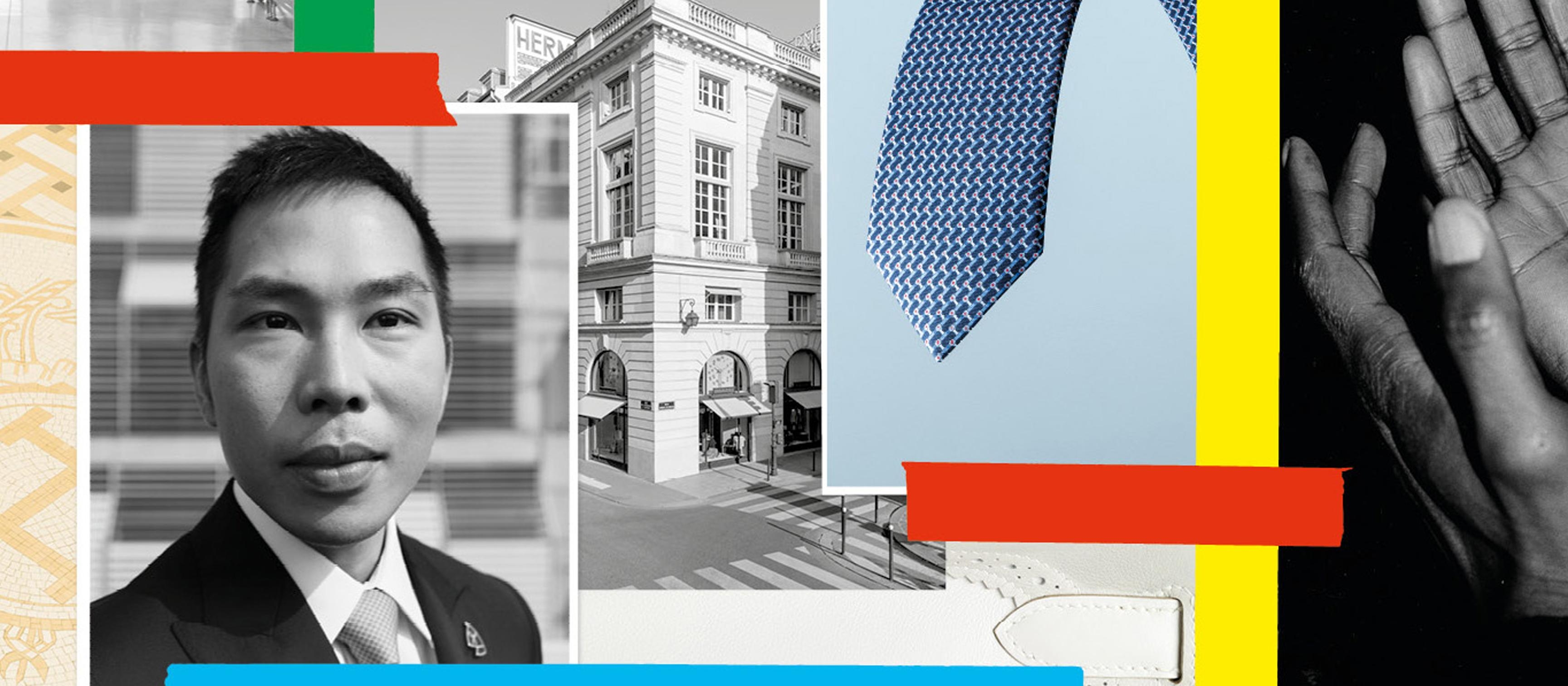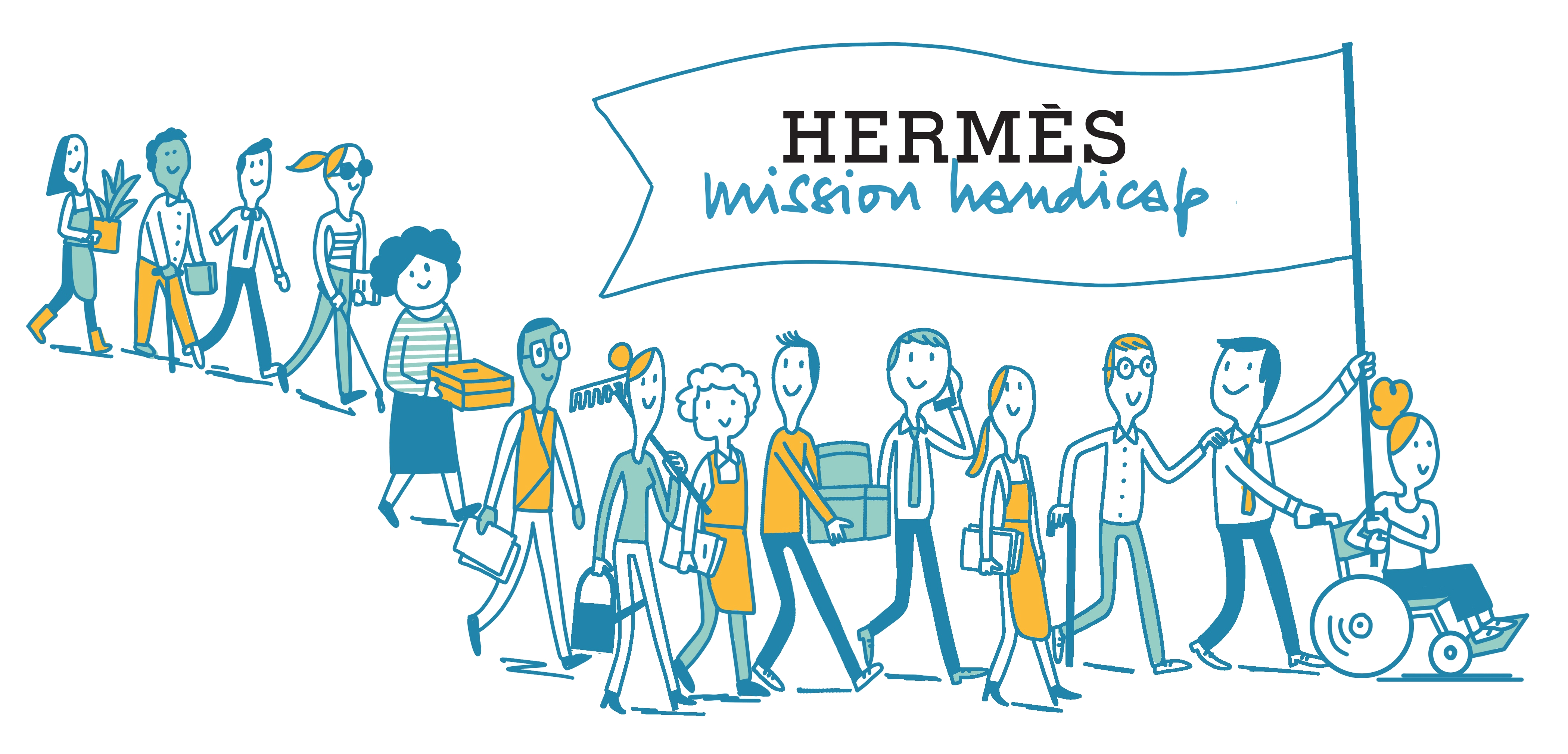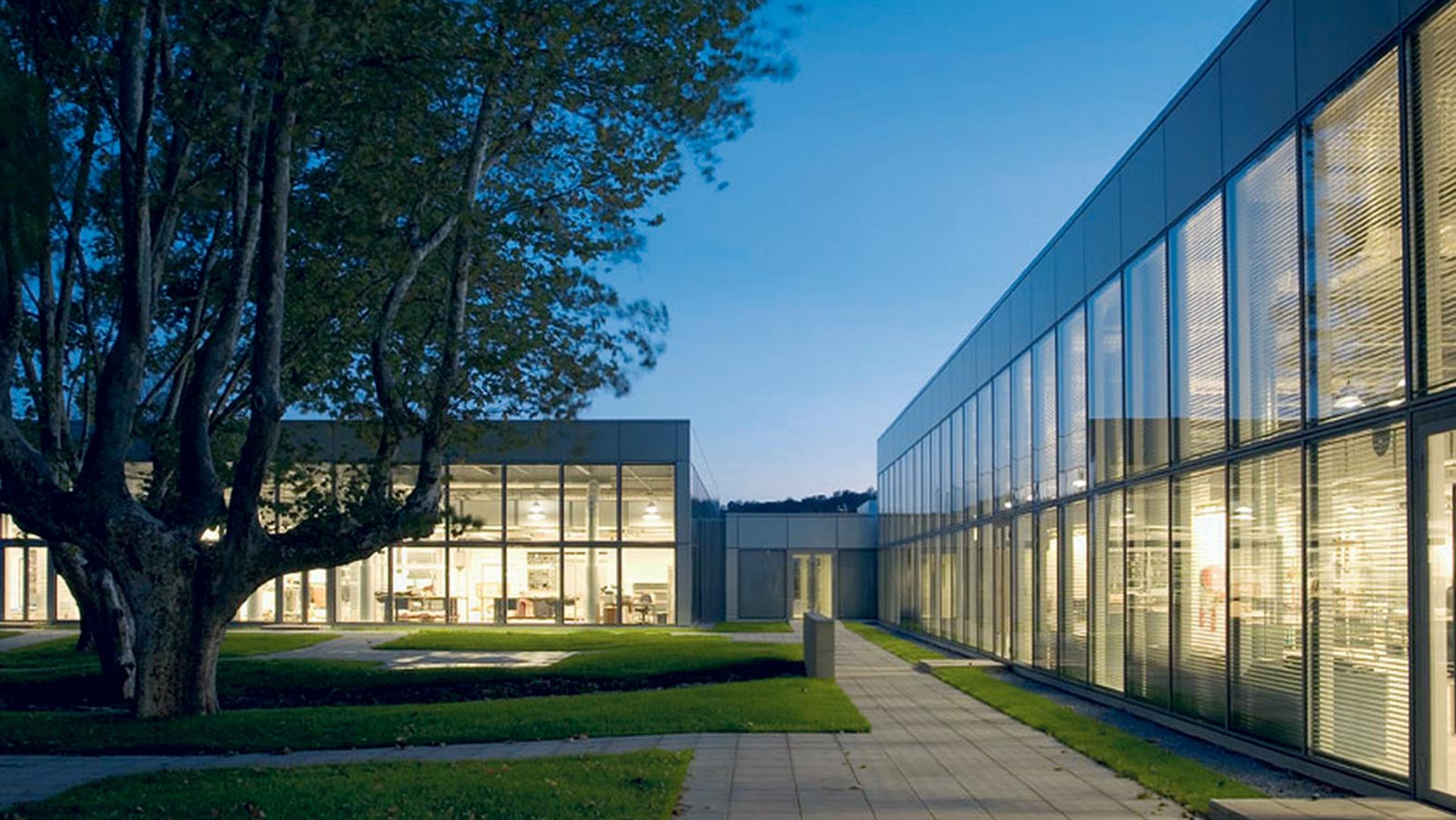
Our teams
"Hermès is a mosaic of men and women working daily for its development all over the world. Beyond their uniqueness, the people who bring the group to life have a common desire to share certain unifying and founding values of the spirit that has characterised Hermès since 1837."
Henri-Louis Bauer President of the Executive Management Board of Émile Hermès SARL
Axel Dumas, Executive Chairman
Ambition
Hermès places People at the heart of its corporate project. This is reflected first and foremost by the desire to recruit talents from various backgrounds and ensure their integration; then by the commitment to preserving the health and protection of all employees in the face of life’s ups and downs, thanks to a core social protection. Lastly, Hermès pays particular attention to the professional development and achievement of each individual in their work.
The Hermès “Hearts & Crafts” social model is based on four strategic pillars providing a common reference framework for the Group’s initiatives in terms of supporting women and men:
- Managerial Philosophy: A managerial philosophy anchored in humanist principles, embodied by managers cultivating a wide range of freedom in an inclusive and diverse working environment
- Health and Well-being: Special attention to the well-being and protection of employees, their physical and psychological health, and the balance between their professional and private lives, particularly during periods of vulnerability
- Recognition and Compensation: The recognition given to employees, through compensation and value redistribution schemes, which testifies to the value Hermès places on the commitment and work of each of its employees, regardless of their métier and geographical location. This recognition is also expressed by the development of employability and lifelong learning, thanks to particular attention paid to human development, through a wide range of training courses and support schemes and the transmission of the savoir-faire of excellence
- Meaning at Work: The ability for each person to find meaning in their work, by being part of communities on a human scale, by forming a true social collective, by constantly striving to achieve high quality in everything. The freedom of action, intrinsically linked to the craftsmanship model, also allows each employee to shape their work in their own way and to find meaning and pride in it, while allowing everyone to be involved and responsible
Organisation
The social policy of Hermès is a fundamental pillar of the house, aiming to ensure the well-being and fulfillment of its employees. This policy is led by the Group's Human Resources Director, who is also a member of the Executive Committee. Under her supervision, the Human Resources Department implements a number of initiatives to improve working conditions and promote a healthy and inclusive work environment, relying on the Human Resources departments of subsidiaries worldwide. The Executive Committee, of which she is a part, plays a crucial role in overseeing these actions, ensuring they are aligned with the Group's values and strategic objectives.
Workforce growth over the past 10 years
The group’s economic performance has been accompanied by continuous job creation. With a doubling of the workforce over the past 10 years, the group has surpassed the threshold of 25,000 employees, with more than 60% based in France.
2024 Key figures
Managerial philosophy
Our ambition with regards to diversity and inclusion
The sustainability of the business model relies on the contribution of each employee to a collective project. The humanist culture and social model, which are passed on from generation to generation, nurture fundamental values, one of which is freedom: freedom to create, to act and to undertake, to be who you are and for each person to bring their own unique perspective. The Group’s managerial philosophy, in this humanist model, is unique and singular. Respect for men and women, savoir‑faire and the history of the House are passed on by example, exchange and dialogue, and a detailed understanding of what comprise the fundamentals of Hermès.
The Diversity & Inclusion ambition for the entire House is built around a shared commitment and the development of specific actions that meet local needs. Each Hermès entity is asked to commit to a “common foundation” action programme based on three areas:
- eradicate all forms of discrimination
- achieve gender equality
- promote the inclusion of people with disabilities
Equality between women and men
Hermès is constantly committed to promoting gender equality. Particular attention is paid to equality, particularly in the awarding of equal pay for equal work and ensuring equal opportunities in access to employment and internal promotions. At all levels of the organisation, equality of opportunity, diversity and inclusion in terms of employment, training, supervision and compensation are backed by the House’s commitment, with the objective of taking concrete and sustainable actions.
| Professional gender equality index (France) | 92/100 |
| Percentage of women in workforce | 68 % |
| Percentage of women in management positions | 48 % |
| Percentage of women on governing bodies | 59 % |
| Percentage of women in the Excutive Committee | 33 % |
| Percentage of women in the Supervisory board | 50 % |
Eradicate all forms of discrimination
The commitment as a responsible employer implemented within the Group consists of combating all forms of discrimination, in each entity, in France and internationally.
In 2024, as with every year, efforts to raise awareness of the risks of discrimination and the existence of unconscious bias continued in a number of different formats, targeting several populations of employees.
Key figures :
- the entire community of the Group’s D&I contacts has been trained on the issues of diversity and inclusion through the Diversity Fresco, as well as on unconscious bias
- an e‑learning awareness module on “unconscious biases and micro‑inequities” has been deployed worldwide : 1,200 employees have already had their awareness raised in France and abroad
- Alterego Programme to promote inclusion : more than 1,050 managers have already been trained since the launch of the training
Integrate people with disabilities
Hermès pursues a proactive policy regarding the integration of people with disabilities and their retention in employment across its various professions. This commitment is long-term, marked by the signing of the third group disability agreement in 2023 with all union coordinators to address the following challenges:
The actions undertaken are structured around four pillars:
- Employment and integration
- Retention in employment
- Development of purchases from the supported sector
- Raising awareness about disability

2024 Key figures
Care and well-being
Hermès aims to guarantee all its employees a working environment conducive to their physical and psychological well‑being, and enabling them to reconcile their professional activity and their personal life. In addition to the work environment, and in line with the House’s protective vision towards its employees, Hermès has launched a project to roll out universal social protection for all its employees worldwide, based on five social protection pillars, which should enable everyone to face life’s uncertainties with more peace of mind.
Pour répondre à cette ambition, Hermès structure les axes suivants :
- Promoting Health & Satefy within the group
- Combatting harassment
- Protection and prevention benefits for all employees
- Accompany and provide support adapted to different life stages
- Flexible working and adjustments to working time
Employee satisfaction rate
A survey titled "Hermès Hears" was conducted in March 2024, focusing on health, well-being, and engagement for all employees worldwide. It includes an assessment of job satisfaction, meaning, fulfillment, and stress measurement. This survey helps establish an overview of our strengths and areas for improvement on these topics, before initiating new concrete actions in a cycle of continuous improvement.
| Group | |
| Percentage of employees who say they are proud to work for Hermès (2024 Hermès Hears survey) | 91% |
| Absenteism rate | 2.69% |
A universal social protection
With the aim of protecting and supporting its employees in the face of life’s uncertainties and in line with its social model and the Group’s values, Hermès has created a basic level of universal social protection for all its employees worldwide, based on five pillars: parenthood, healthcare, retirement, death and disability. The objective is to cover 100% of employees worldwide by 2026. This ambitious base aims to ensure a decent quality of life for employees and their families, to enable them to be covered in the event of a personal accident, and to build up savings in order to be able to plan for the medium and long term with peace of mind.
Reward and recognition
The success of the House of Hermès is above all a collective success, made possible by the quality of work and the commitment of all. The recognition given to employees is an essential pillar of the House’s social model, enabling everyone to feel an actor and contributor to collective success. This recognition is expressed in particular through compensation and value‑sharing methods in which the collective plays a large part. Hermès wishes to continue this ambition, by reinforcing the pedagogy and transparency around its systems in order to allow a good understanding of them. The recognition that the Group wishes to give to its employees is not only financial, it is also expressed through the promotion of lifelong employability, through training and transfer of savoir‑faire.
Remuneration
Hermès provides its employees with individual and collective compensation that respects their commitment to their desire to share the value created.
- Faithful to its commitment as a responsible employer, Hermès paid an exceptional bonus of €4,500 to all group employees worldwide in February 2025 for their dedication and contribution to the results. A similar bonus had already been paid in 2024
- Employee Share Ownership Plans : Employee share ownership mechanisms are part of the group's long-term compensation policies and contribute to the motivation and retention of its employees over time. Thus, the Hermès group has offered democratic free share plans to all its employees, both in France and internationally, on six occasions; these were granted in 2007, 2010, 2012, 2016, 2019, and 2023
- The company will pay €235 million in profit-sharing and participation for 2024 in France, thanks to profit-sharing agreements that allow employees to be associated with the development of locally determined and relevant indicators with regard to the activity and environment of each French subsidiary, particularly quality, safety, and productivity
Promoting professional fulfilment and employability
Know-how lies at the heart of our house. Recognising, reinforcing and passing on these values, and offering working conditions that foster employees’ personal development throughout their career are fundamental elements of our humanistic culture. To provide sustainable career paths, Hermès is committed to developing the employability of its workforce through access to training adapted to all.
2024 Key figures
Meaningful work
Hermès’ ambition is to create conditions such that each person, participating in a collective adventure, within working communities on a human scale, finds meaning in their work and their career path.
Hermès' policy is to ensure the implementation and guarantee of quality social dialogue, which is essential for its proper functioning. Internationally, social dialogue takes various forms, depending on local customs and regulations. It can take place through regular meetings and discussions with employee representatives (Taiwan, Korea, Türkiye, Japan, Germany, Italy) or directly with employees.
In order to embody its commitment as a socially responsible employer and to 'give back to the world what it gives us,' Hermès encourages the involvement of its employees in the social and solidarity economy. Skills-based volunteering missions with partner associations identified by the sustainable development teams, the Hermès Corporate Foundation, and the Group Disability Mission, as well as with local structures, are regularly offered to our employees.
Les ailes d'Hermès
Between 2022 and 2024, Hermès offered a philanthropic networking programme: "Sur les ailes d’Hermès," which allows many employees from all Group entities to take action by making themselves useful. Based on different themes: environment, culture, and savoir-faire, numerous projects were proposed, giving employees the opportunity to make concrete contributions to the projects of associations or organisations supported locally by the Group’s subsidiaries.
Our policies and publications
To go further and discover our main sustainability policies and our recent publications





